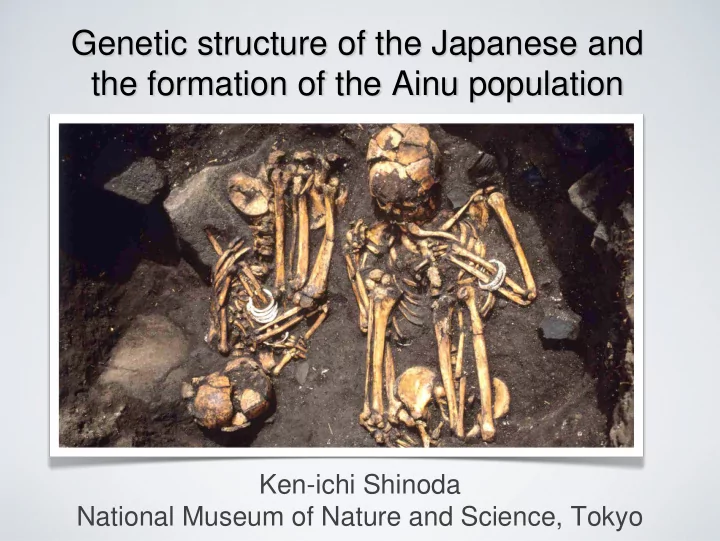

Genetic structure of the Japanese and the formation of the Ainu population Ken-ichi Shinoda National Museum of Nature and Science, Tokyo
Mitochondrial DNA mitochondria Structures of mtDNA nuclear genome 3 billion 16,569 base pair
History of the analysis 1980 ’ s Analysis of the DNA digestion pattern with restriction enzymes. 1990 ’ s Analysis of sequence in a region of the mitochondrial genome that undergoes frequent mutation. 21th century Analysis of the complete DNA sequence of mitochondrial genomes.
Human migration and formation of mitochondrial DNA haplogroups 60,000-20,000 BP. A X D C A B D JT A B H F U 20,000 BP.- D I X B C N U N R My A D M N L2 M M N L3 L Mx L1 Q M L1 B C N P L2 A D L3 Mz Nz L0 150,000-60,000 BP.
Y Z G A C M7a N9b D4 D5 M8a M7b B5 B4 F E M7c Distribution center of each haplogroup
MtDNA haplogroup frequencies of mainland Japanese N9a F N9b D4 B5 B4 M9 D5 M8 M7b A M7c M7a G Tanaka et al. 2004
Korea D4 Japan Northern China Frequency distribution of haplogroup D4 in each population
Jomon vs. Yayoi 40,000 BP. 15,000 BP. B.C. 1,000 A.D. 300 Paleolithic Jomon Yayoi Historic Immigrant Yayoi female Jomon female
Jomon Yoyoi
The American Journal of Human Genetics 83, 445–456, October 10, 2008 Relatedness between 7003 Japanese Individuals Han Chinese 中国人 Mainland Japanese Okinawa For the Japanese individuals, there were two main clusters: the Hondo cluster (red plus signs) and the Okinawa cluster (green crosses).
Dual structure model (K. Hanihara 1991) ( Okhotsk 5-10 century ) Yayoi Historical Palaeolithic to Jomon 40,000-12,000 BP. 3,000-1,700 BP. 1,700 BP. -
Comparison of haplogroup frequencies between the Jomon, Yayoi, and modern Japanese populations. D4 Z A B N9a F M8 n= 78 M10 Z M8 M Y N9b D4 A N9 G B M7 F D5 M7a a bc n= 1312 B N9b G M7a M10 D4 D4h2 M8 F n= 119 A D5 M7 bc D4 is most common in the Japanese and Yayoi populations.
BSP of female effective population size (Nef) through time for Japanese mtDNA lineages. Initial population growth LGM Rapid population growth PLoS ONE 6(6): e21509.
Population estimates by Koyama (1984) 5,000-4,000BP 40,00-30,00BP 6,000-5,000BP 3,000-30,00BP 10,000-6,000BP
Moving on to rice agriculture Original place of rice agriculture 5000 BP. 3000 BP. 3000 BP.
Comparison of haplogroup frequencies between Okinawa, Ainu, and modern Japanese populations. M8 M10 M N9b Y D G A B F M7 N9 M7a Other a bc n=1312 D M7a A B F Other G M N9b M7bc n=372 D G M7 Y M7a A B F N9b bc n=51
Hokkaido Jomon M7a N9b G1b D4h2 Tohoku Jomon N9b M7a D4 D4h2 Kyushu Yayoi Kanto Jomon M7a N9b B4 M10 Z A D4 M8 D4 F M8 M7bc N9a F B4 G2 D5
Distributions of haplogroups G and Y of each population Ainu Haplogroup G Haplogroup Y
Population History of Hokkaido 13th century 7th century Satumon Jomon to Epi-Jomon Ainu Okhotsk culture 9th century 5th century other 2% D4 9% M7a 5% D4h2 G1b D G1b Y19% 17% 24% 18% 10% Y 33% F 2% Y 43% G1b B 2% 11% Z 1% M7a 6% G N9b 8% M7b 1% N9b M9 1% C 5% 25% M7a 7% 65% A 7% M8a 1% N9b A 8% A 4% M7a N9b 21% 16% 11% M7b,c 4% C5a 4% B4 3% B4 1% Modern Ainu Recent Ainu Okhotsk culture Jomon (Edo era)
Thank you
Recommend
More recommend